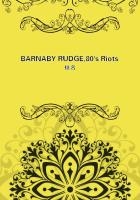
第59章
Gliding along the silent streets, and holding his course where they were darkest and most gloomy, the man who had left the widow's house crossed London Bridge, and arriving in the City, plunged into the backways, lanes, and courts, between Cornhill and Smithfield;
with no more fixedness of purpose than to lose himself among their windings, and baffle pursuit, if any one were dogging his steps.
It was the dead time of the night, and all was quiet. Now and then a drowsy watchman's footsteps sounded on the pavement, or the lamplighter on his rounds went flashing past, leaving behind a little track of smoke mingled with glowing morsels of his hot red link. He hid himself even from these partakers of his lonely walk, and, shrinking in some arch or doorway while they passed, issued forth again when they were gone and so pursued his solitary way.
To be shelterless and alone in the open country, hearing the wind moan and watching for day through the whole long weary night; to listen to the falling rain, and crouch for warmth beneath the lee of some old barn or rick, or in the hollow of a tree; are dismal things--but not so dismal as the wandering up and down where shelter is, and beds and sleepers are by thousands; a houseless rejected creature. To pace the echoing stones from hour to hour, counting the dull chimes of the clocks; to watch the lights twinkling in chamber windows, to think what happy forgetfulness each house shuts in; that here are children coiled together in their beds, here youth, here age, here poverty, here wealth, all equal in their sleep, and all at rest; to have nothing in common with the slumbering world around, not even sleep, Heaven's gift to all its creatures, and be akin to nothing but despair; to feel, by the wretched contrast with everything on every hand, more utterly alone and cast away than in a trackless desert; this is a kind of suffering, on which the rivers of great cities close full many a time, and which the solitude in crowds alone awakens.
The miserable man paced up and down the streets--so long, so wearisome, so like each other--and often cast a wistful look towards the east, hoping to see the first faint streaks of day.
But obdurate night had yet possession of the sky, and his disturbed and restless walk found no relief.
One house in a back street was bright with the cheerful glare of lights; there was the sound of music in it too, and the tread of dancers, and there were cheerful voices, and many a burst of laughter. To this place--to be near something that was awake and glad--he returned again and again; and more than one of those who left it when the merriment was at its height, felt it a check upon their mirthful mood to see him flitting to and fro like an uneasy ghost. At last the guests departed, one and all; and then the house was close shut up, and became as dull and silent as the rest.
His wanderings brought him at one time to the city jail. Instead of hastening from it as a place of ill omen, and one he had cause to shun, he sat down on some steps hard by, and resting his chin upon his hand, gazed upon its rough and frowning walls as though even they became a refuge in his jaded eyes. He paced it round and round, came back to the same spot, and sat down again. He did this often, and once, with a hasty movement, crossed to where some men were watching in the prison lodge, and had his foot upon the steps as though determined to accost them. But looking round, he saw that the day began to break, and failing in his purpose, turned and fled.
He was soon in the quarter he had lately traversed, and pacing to and fro again as he had done before. He was passing down a mean street, when from an alley close at hand some shouts of revelry arose, and there came straggling forth a dozen madcaps, whooping and calling to each other, who, parting noisily, took different ways and dispersed in smaller groups.
Hoping that some low place of entertainment which would afford him a safe refuge might be near at hand, he turned into this court when they were all gone, and looked about for a half-opened door, or lighted window, or other indication of the place whence they had come. It was so profoundly dark, however, and so ill-favoured, that he concluded they had but turned up there, missing their way, and were pouring out again when he observed them. With this impression, and finding there was no outlet but that by which he had entered, he was about to turn, when from a grating near his feet a sudden stream of light appeared, and the sound of talking came. He retreated into a doorway to see who these talkers were, and to listen to them.
The light came to the level of the pavement as he did this, and a man ascended, bearing in his hand a torch. This figure unlocked and held open the grating as for the passage of another, who presently appeared, in the form of a young man of small stature and uncommon self-importance, dressed in an obsolete and very gaudy fashion.